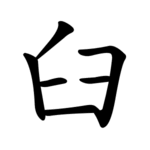臼
Jump to navigation
Jump to search
| ||||||||
| ||||||||
Translingual
[edit]| Stroke order | |||
|---|---|---|---|

| |||
Han character
[edit]臼 (Kangxi radical 134, 臼+0, 6 strokes, cangjie input 竹難 (HX), four-corner 77770, composition ⿵⿲丨⿱丿一⿹𠃍一一)
- Kangxi radical #134, ⾅.
Derived characters
[edit]- Appendix:Chinese radical/臼
- 㧮, 桕, 𭹉, 𧧖, 𧳈, 𩢹, 𩶧, 齨, 𠜃, 𨋺, 𨾹, 𩒦, 𩶿, 䳎
- 兒, 帠, 䊆, 䢅, 䳔, 鼠, 𪠨, 𡘑, 𭇦, 𣆫, 𨿀, 𩣅, 𪓢, 臽, 𡚒, 㳫, 𤘈, 𦭻, 𮃼, 𦽭, 閰, 裒
- 𦥚, 㖬, 𢝘, 揑, 湼, 䛼, 毁, 隉, 㷐, 毀, 𢶽, 𣫞
References
[edit]- Kangxi Dictionary: page 1003, character 1
- Dai Kanwa Jiten: character 30173
- Dae Jaweon: page 1459, character 11
- Hanyu Da Zidian (first edition): volume 5, page 3037, character 1
- Unihan data for U+81FC
Chinese
[edit]| simp. and trad. |
臼 | |
|---|---|---|
Glyph origin
[edit]| Historical forms of the character 臼 |
|---|
| Shuowen Jiezi (compiled in Han) |
| Small seal script |

|
Pictogram (象形) : a mortar. See the original version of 舂, in which a pestle is visibile on top. Unrelated to the top component of 學, 兒, 䳔, 鼠, and 叟.
Pronunciation
[edit]- Mandarin
- Cantonese (Jyutping): kau3 / kau5
- Hakka
- Eastern Min (BUC): kô / kêu
- Southern Min
- Wu (Shanghai, Wugniu): 6jieu
- Mandarin
- (Standard Chinese)+
- Hanyu Pinyin:
- Zhuyin: ㄐㄧㄡˋ
- Tongyong Pinyin: jiòu
- Wade–Giles: chiu4
- Yale: jyòu
- Gwoyeu Romatzyh: jiow
- Palladius: цзю (czju)
- Sinological IPA (key): /t͡ɕi̯oʊ̯⁵¹/
- (Standard Chinese)+
- Cantonese
- (Standard Cantonese, Guangzhou–Hong Kong)
- Jyutping: kau3 / kau5
- Yale: kau / káuh
- Cantonese Pinyin: kau3 / kau5
- Guangdong Romanization: keo3 / keo5
- Sinological IPA (key): /kʰɐu̯³³/, /kʰɐu̯¹³/
- (Standard Cantonese, Guangzhou–Hong Kong)
- Hakka
- (Sixian, incl. Miaoli and Neipu)
- Pha̍k-fa-sṳ: khiû
- Hakka Romanization System: kiuˊ
- Hagfa Pinyim: kiu1
- Sinological IPA: /kʰi̯u²⁴/
- (Meixian)
- (Sixian, incl. Miaoli and Neipu)
- Eastern Min
- (Fuzhou)
- Bàng-uâ-cê: kô / kêu
- Sinological IPA (key): /kʰou²⁴²/, /kʰiɛu²⁴²/
- (Fuzhou)
Note:
- kô - vernacular;
- kêu - litereary.
- Southern Min
- (Hokkien: Quanzhou)
- Pe̍h-ōe-jī: khǔ
- Tâi-lô: khǔ
- IPA (Quanzhou): /kʰu²²/
- (Hokkien: General Taiwanese, Xiamen, Zhangzhou)
- Pe̍h-ōe-jī: khū
- Tâi-lô: khū
- Phofsit Daibuun: qu
- IPA (Xiamen, Zhangzhou): /kʰu²²/
- IPA (Taipei, Kaohsiung): /kʰu³³/
- (Hokkien: Quanzhou)
- Pe̍h-ōe-jī: kiǔ
- Tâi-lô: kiǔ
- IPA (Quanzhou): /kiu²²/
- (Hokkien: Xiamen, Zhangzhou)
- Pe̍h-ōe-jī: kiū
- Tâi-lô: kiū
- Phofsit Daibuun: kiu
- IPA (Xiamen, Zhangzhou): /kiu²²/
- (Hokkien: Quanzhou)
Note:
- khǔ/khū - vernacular;
- kiǔ/kiū - literary.
- (Teochew)
- Peng'im: ku6 / giu6
- Pe̍h-ōe-jī-like: khŭ / kiŭ
- Sinological IPA (key): /kʰu³⁵/, /kiu³⁵/
Note:
- ku6 - vernacular;
- giu6 - literary.
- Middle Chinese: gjuwX
- Old Chinese
- (Baxter–Sagart): /*C.[ɡ]ʷəʔ/
- (Zhengzhang): /*ɡuʔ/
Definitions
[edit]臼
Compounds
[edit]References
[edit]Japanese
[edit]Kanji
[edit]臼
Readings
[edit]Etymology 1
[edit]| Kanji in this term |
|---|
| 臼 |
| うす Grade: S |
| kun'yomi |
| For pronunciation and definitions of 臼 – see the following entry. | ||
| ||
| (This term, 臼, is an alternative spelling of the above term.) |
Etymology 2
[edit]| Kanji in this term |
|---|
| 臼 |
| おす Grade: S |
| kun'yomi |
| For pronunciation and definitions of 臼 – see the following entry. | ||
| ||
| (This term, 臼, is an alternative spelling of the above term.) |
Korean
[edit]Hanja
[edit]臼 (eum 구 (gu))
- This term needs a translation to English. Please help out and add a translation, then remove the text
{{rfdef}}.
Vietnamese
[edit]Han character
[edit]- This term needs a translation to English. Please help out and add a translation, then remove the text
{{rfdef}}.
Categories:
- CJK Unified Ideographs block
- Han script characters
- Kangxi Radicals block
- Han character radicals
- Translingual lemmas
- Translingual symbols
- Han pictograms
- Chinese lemmas
- Mandarin lemmas
- Cantonese lemmas
- Hakka lemmas
- Eastern Min lemmas
- Hokkien lemmas
- Teochew lemmas
- Wu lemmas
- Middle Chinese lemmas
- Old Chinese lemmas
- Chinese hanzi
- Mandarin hanzi
- Cantonese hanzi
- Hakka hanzi
- Eastern Min hanzi
- Hokkien hanzi
- Teochew hanzi
- Wu hanzi
- Middle Chinese hanzi
- Old Chinese hanzi
- Chinese nouns
- Mandarin nouns
- Cantonese nouns
- Hakka nouns
- Eastern Min nouns
- Hokkien nouns
- Teochew nouns
- Wu nouns
- Middle Chinese nouns
- Old Chinese nouns
- Chinese terms with IPA pronunciation
- Chinese terms spelled with 臼
- Japanese kanji
- Japanese jōyō kanji
- Japanese kanji with goon reading ぐ
- Japanese kanji with kan'on reading きゅう
- Japanese kanji with historical kan'on reading きう
- Japanese kanji with kun reading うす
- Japanese kanji with kun reading おす
- Japanese terms spelled with 臼 read as うす
- Japanese terms read with kun'yomi
- Japanese nouns
- Japanese lemmas
- Japanese terms spelled with secondary school kanji
- Japanese terms with 1 kanji
- Japanese terms spelled with 臼
- Japanese single-kanji terms
- Japanese terms spelled with 臼 read as おす
- Korean lemmas
- Korean hanja
- Vietnamese lemmas
- Vietnamese Han characters
- CJKV radicals
